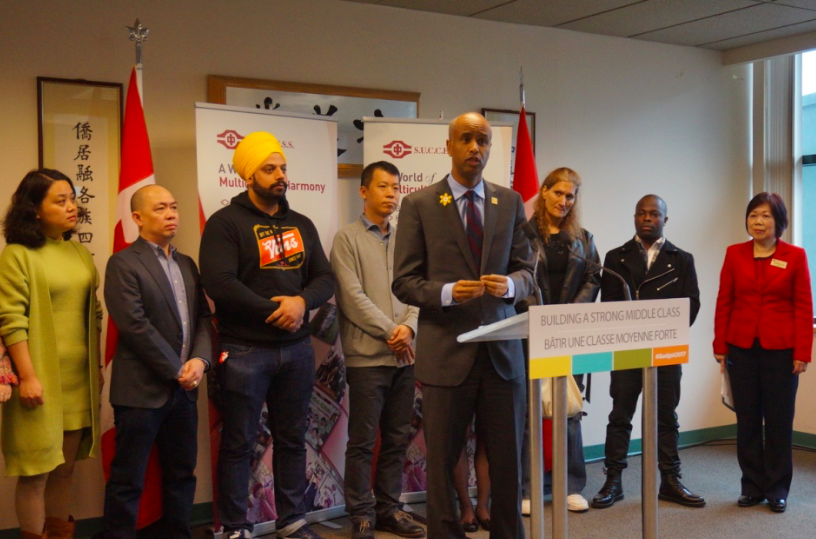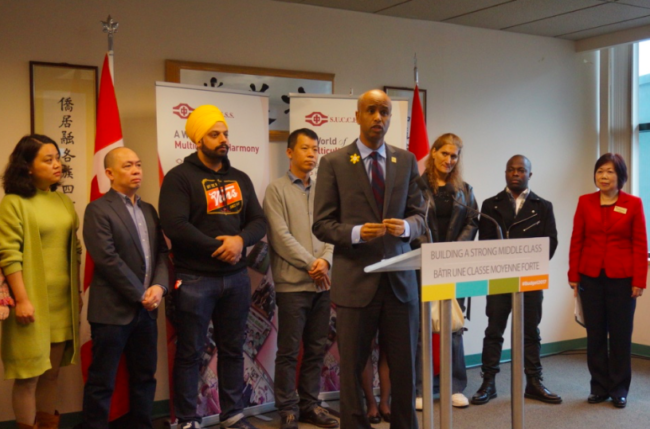Canada has a plan to stop qualified immigrant doctors from driving taxis
By Jenny Uechi

Immigration, Refugees and Citizenship Canada minister Ahmed Hussen makes an announcement in Vancouver about funding to help newcomers get their foreign credentials recognized. Photo by Jenny Uechi
The Trudeau government is touting a new solution for immigrants that arrive in Canada but wind up without a job in their field of expertise.
If it works it would solve a problem that affects nearly one million immigrants. In fact, according to a report released in January 2016, nearly 850,000 Canadians — over 60 per cent of whom are immigrants — end up underemployed or unemployed because their credentials aren’t recognized in Canada.
Speaking in Vancouver on Thursday, Immigration, Refugees and Citizenship Minister Ahmed Hussen offered details about the plan that was announced in the new federal budget unveiled on March 22.
“We recognize that newcomers face particular challenges when they attempt to get their credentials recognized… When newcomers cannot succeed, it’s a great loss to them because they can’t fulfill their potential, but it’s also a great loss to our country because we need their contributions, their skills, and we need them to work at their full potential in their chosen fields,” Minister Hussen said.
An earlier 2012 report by the federal Immigration Department found that in a survey of 50,000 cab drivers across Canada, 200 were doctors or have PhDs, and that 20 per cent of drivers who immigrated to Canada have undergraduate university degrees or master’s.
Although Minister Hussen didn’t reference this specific report, many immigrants have voiced concerns in recent years about being unable to find work that matched their qualifications after moving to Canada.
As part of Finance Minister Bill Morneau’s budget, Hussen said Ottawa would commit $27.5 million over five years, starting in 2017–18, and $5.5 million per year each year after this, for a targeted employment strategy for new Canadians.
Helping immigrants obtain credentials before arrival
One thing that was clear was that the federal government would still require immigrants to take certain exams and fill out applications to prove their credentials in Canada. But he said the process will be easier, with federal government providing some financial support to qualified immigrants wanting to work in their professional field, rather than taking on survival jobs and giving up on their career.
Hussen said the government would expand pre-arrival services that would help newcomers obtain their certification and licensing before arriving in Canada. Hussen also announced that immigrants would be able to apply for a loan to them get their foreign credentials recognized, such as licensing exams, training, travel and skills upgrading.
“Think of the doctor who will use these loans to pay for application fees, for exams, for income support before becoming a licensed physician in Canada,” he said. “Think of the engineer who will use these loans to support their families, while they study hard and pay for the exam fees, and finally become a licensed engineer and fulfill their potential here.”
“The importance of immigrants to our economy can’t be understated,” Minister Hussen said. “I personally can attest that Canadian generosity is what got me here.” He said that when he came to Canada as an unaccompanied teenager from Somalia, the robust programs by the Canadian government that helped him adapt to the school and work environment.
“I am thrilled and excited about this new initiative,” said Marius Alparaque, a coordinator of pre-arrival programs for the Multicultural Helping House Society in Vancouver.
“We advocated for these to be included in the pre-arrival program to fully prepare the new immigrant even before they get here.”
He said career readiness and accreditation pathways are “excellent enhancements” and said the changes are welcomed by his fellow workers who deal with newcomers to Canada.
Source: Canadian National Observer

